高中英语语法专项:一般将来时的被动语态
- 格式:pptx
- 大小:680.88 KB
- 文档页数:16

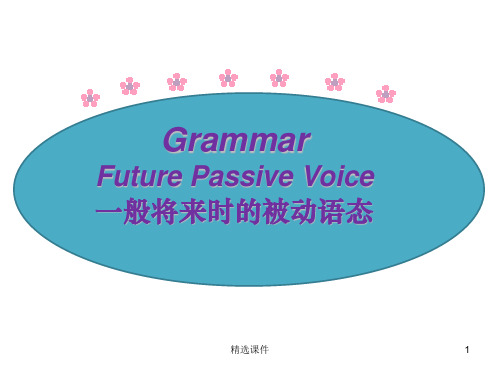

一般将来时的被动语态(The Future Passive Voice )一、简单回顾一般将来时和被动语态1、一般将来时一般将来时表示__________。
常与表示将来的时间状语连用。
常用的表达形式共有五种:①助动词will/ shall+动词原形1. Tomorrow will be Sunday. 明天就是星期天。
2. The rain will stop soon. 雨很快就要停了。
3. Shall we go there at five? 我们五点钟去那儿,好吗?4. Will you please open the door? 请你把门打开,好吗?②be going to+动词原形1. We’re going to meet outside the school gate. 我们打算在校门口见面。
2. Look! It’s going to rain. 瞧!快下雨了。
③用现在进行时表示将来表示位置转移的动词(如:go, come, leave, start, arrive等),可用现在进行时表示将来时。
如:1. Uncle Wang is coming. 王叔叔就要来了。
2. They’re leaving for Beijing. 他们即将前往北京。
④用一般现在时表示将来根据规定或时间表预计要发生的动作,在时间和条件状语从句中,都可用一般现在时表示将来时。
如:1. The new term starts (begins) on August 29th. 新学期八月二十九日开学。
2. If it doesn’t rain tomorrow, we will go out for a picnic. 如果明天不下雨,我们将去野餐。
⑤“be+动词不定式”或“be about to +动词原形”1. He is to visit Japan next year. 明年他将访问日本。
2. They’re about to leave. 他们就要走了。

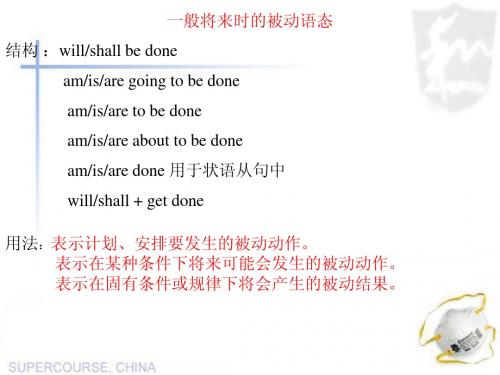
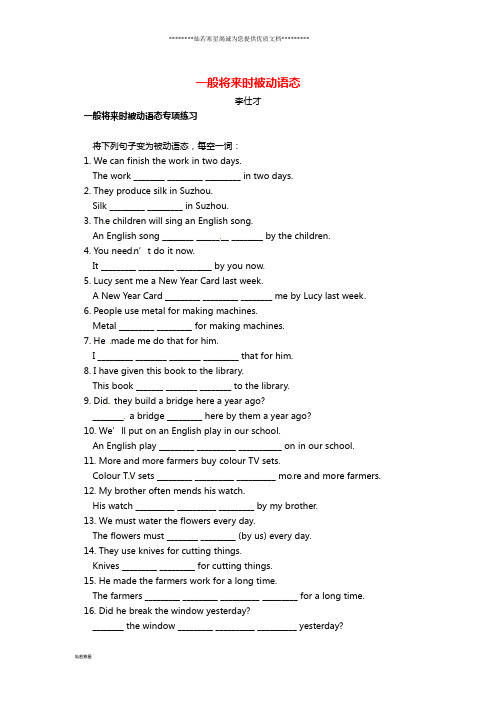
一般将来时被动语态李仕才一般将来时被动语态专项练习将下列句子变为被动语态,每空一词:1. We can finish the work in two days.The work ________ _________ _________ in two days.2. They produce silk in Suzhou.Silk _________ _________ in Suzhou.3. The children will sing an English song.An English song ________ ________ ________ by the children.4. You needn’t do it now.It _________ _________ _________ by you now.5. Lucy sent me a New Year Card last week.A New Year Card _________ _________ ________ me by Lucy last week.6. People use metal for making machines.Metal _________ _________ for making machines.7. He made me do that for him.I _________ ________ ________ _________ that for him.8. I have given this book to the library.This book _______ ________ ________ to the library.9. Did they build a bridge here a year ago?________ a bridge _________ here by them a year ago?10. We’ll put on an English play in our school.An English play _________ __________ ___________ on in our school. 11. More and more farmers buy colour TV sets.Colour T V sets _________ __________ __________ mo re and more farmers.12. My brother often mends his watch.His watch __________ __________ _________ by my brother.13. We must water the flowers every day.The flowers must ________ _________ (by us) every day.14. They use knives for cutting things.Knives _________ _________ for cutting things.15. He made the farmers work for a long time.The farmers _________ _________ __________ _________ for a long time. 16. Did he break the window yesterday?________ the window _________ __________ __________ yesterday?17. They have sold out the light green dresses.The light green dresses __________ __________ __________ out. 18. We clean the classroom every day.The classroom _________ _________ every day.19. You must not plant trees in very dry earth.Trees _________ _________ __________ __________ in very dry earth.20. You can dig a hole in the earth.A Hole _________ __________ __________ in the earth.一般将来时被动语态专项练习参考答案将下列句子变为被动语态,每空一词:1. can be finished2. is produced3. will be sung4. needn’t be done5. was sent to6. is used7. was made to do8. has been given9. Was, built10. will be put11. are bought by12. is often mended13. be watered14. are used15. were made to work16. Was, broken by him17. have been sold18. is cleaned19. must not be planted20. can be dug。
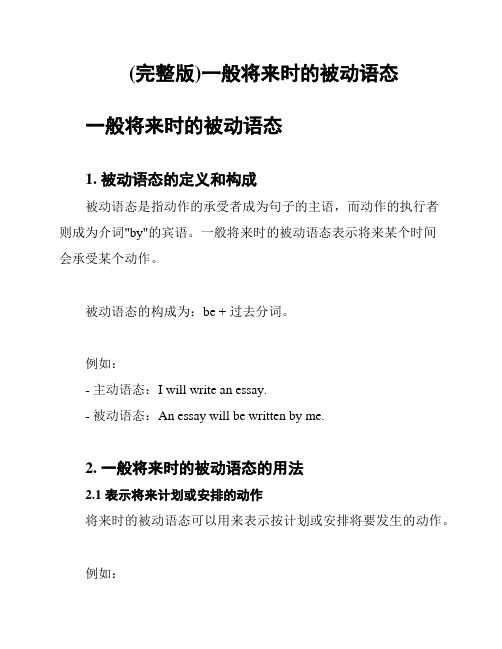
(完整版)一般将来时的被动语态一般将来时的被动语态1. 被动语态的定义和构成被动语态是指动作的承受者成为句子的主语,而动作的执行者则成为介词"by"的宾语。
一般将来时的被动语态表示将来某个时间会承受某个动作。
被动语态的构成为:be + 过去分词。
例如:- 主动语态:I will write an essay.- 被动语态:An essay will be written by me.2. 一般将来时的被动语态的用法2.1 表示将来计划或安排的动作将来时的被动语态可以用来表示按计划或安排将要发生的动作。
例如:- 主动语态:They will hold a ___.- 被动语态:A meeting will be ___.2.2 表示主动语态中的一般将来时的被动语态当主动语态中的谓语动词为一般将来时时,可以转换为一般将来时的被动语态。
例如:- 主动语态:___.- 被动语态:The work will be ___.2.3 阐述将来的预测或推测一般将来时的被动语态也可以用来表达对将来的预测或推测。
例如:- 主动语态:They ___.- 被动语态:A ___.3. 注意事项3.1 动作执行者未知或无关紧要时当我们对动作执行者不感兴趣或无法确定时,可以使用被动语态。
例如:- 主动语态:___ will fix the car.- 被动语态:The car will be fixed.3.2 动作执行者已知但无需强调时当我们知道动作执行者是谁,但无需强调时,可以使用被动语态。
例如:- 主动语态:John will cook the dinner.- 被动语态:The dinner ___.4. 总结一般将来时的被动语态用于表示将来某个时间会承受动作的情况。
它的构成为be + 过去分词,并在一些特定场景下有特殊用法。
在使用一般将来时的被动语态时,需要注意动作执行者未知或无关紧要的情况和动作执行者已知但无需强调的情况。

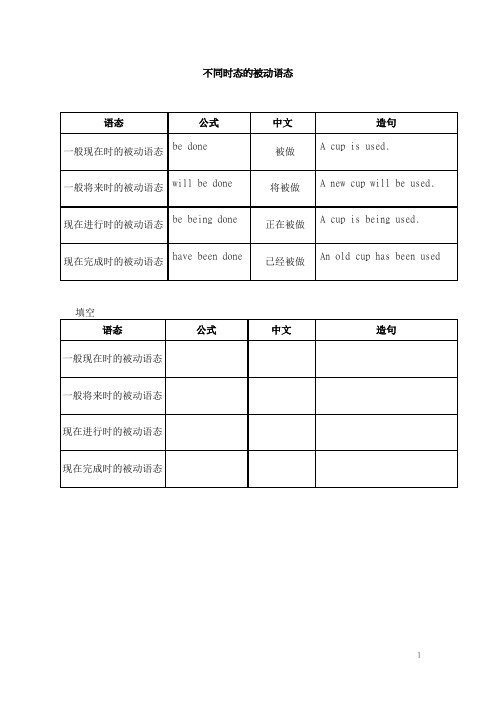
不同时态的被动语态一用所给词的正确形式填空1 The question (discuss) at the meeting next week.2 The young couple’s house(decorate) when they come back.3 A new school (set)up in this area next year.4 The new film is going (direct) by a young director.5 A party (hold) if the weather is fine next Sunday.6 Thirty songs (teach) on the Internet at the end of this month.7 You (punish) if you break the rules in this country.8 More trees (plant)when the old man is free.9 No help (offer)to you if you don’t work hard.10 The pets (take) good care of when they are sent there.二完成句子1 You (allow)to take so much luggage with you on the plane.2 The water (pollute)unless some measures are taken.3 (forget)if you do not go over them.4 I promise that the book (return)before Friday.5. Rubbish (produce electricity)after this kind of new machine is invented.6 These dictionaries (将不会被带出)the library again (by you).7 I’m sure more gold medals(win)by Chinese in the next Olympic Games.8 The old temple in my hometown (rebuild)next month*9 An exhibition of painting is going (hold)at the art museumwhen he comes back.10 Children _______ __ (e)to take more exercise if they have enoughtime.一用所给词的适当形式填空1 will be discussed2 will be decorated3 will be set4 to be directed5 will be held6 will be taught7 will be punished8 will be planted 9. will be offered 10. will be taken二完成句子(用所学语法)1 won’t be allowed 2. will be polluted 3. The words will be forgotten 4 will be returned5. Rubbish will be used to produce electricity6. won’t be taken out of7. will be won8 will be rebuilt 9. to be held 10. will be encouraged一用所给词的适当形式填空1 More than 2,000 trees (plant) here since last year.2.The problem (discuss) many times recently.3 These films (not show) in this village before.4 This song is (teach) twice in our class,5 A lot of soldiers (send) there up to now.6 Plenty of modem films (make) in this country so far.7 Since all the work (finish), the young man will go home soon.8 Several factories (set)up in this village in the last five years.9 Most of the citizens (inform) of the news so far.10 All the walls (paint)since last night.二完成句子(用所学语法)1 That book (translate)into at least 20 foreign languages so far.2 The windows are dirty for they (not clean)for a long time.3 How many times (tell)not to play with fire?4 Many new functions (add) to smart phones nowadasys.5 Computers (use) offices and homes since the 1970s.6 A lot of e-mails (send) through the computer in the past 5 years.7 Planed (use〉since the 1920s.8 A lot of damage (cause) by a storm which swept across North China last night.9 All food (eat up)already.10 —George and Lucy will get married next week. Will you go to their wedding?— No,I (invite).一1 have been planted 2. has been discussed 3. haven’t been shown 4. has been taught5. have been sent6. have been made7. has been finished8. have been set9. have been informed 10. have been painted二1. has been translated2. have not been cleaned3. have you been told4. have been added5. Computers have been used6. have been sent7. have been used8. has been caused9. has been eaten up 10. have not been invited一用所给动词的正确形式填空1 The boy (examine)by the doctor now.2 Look! The duck (draw) by a boy.3 Listen! A piece of sweet music (play) in the hall.4 Something important (discuss)at the moment5 A new building is under (construct)in that village.6. The old people (take) good care of in that center these days.7 A sports meeting (hold) there. Let’s go to watch it.8 Could I stay in your house for a few days? My house (decorate).9 May I use your computer? Mine (repair).10. A big shelter ( build) and it will hold more than 2,000 people.二.完成句子(用所学语法)1. The animals (set free) at present.2. You are not allowed to go into the meeting room. (一个秘密计划正在讨论).3. Since (repair), you can use mine.4.A new library (build) in our school now.5. The wildlife in this area (正受到保护) by people.6. At present the disease (study) by scientists at the moment.7 I (treat) at the hospital now, so I can’t go to the cinema at present.8 These animals (在被捕杀)at such a speed that they will disappear soon.9 Look! The foreign guests (show)around our school by Mr. Zhang.10 Mary is not in the office now. She (interview)。
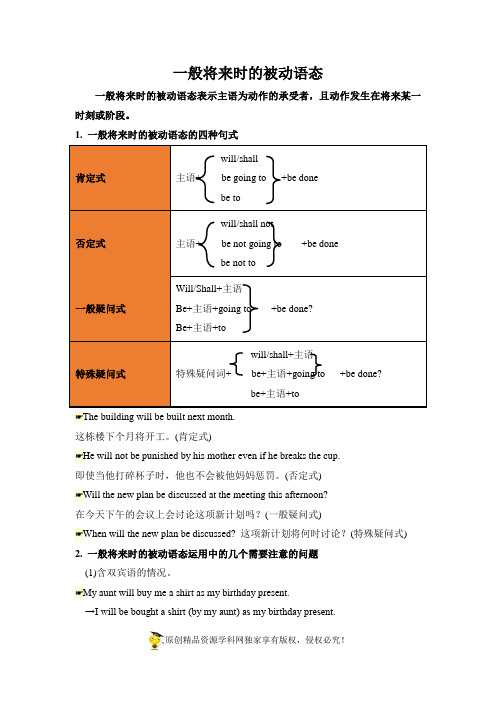
一般将来时的被动语态一般将来时的被动语态表示主语为动作的承受者,且动作发生在将来某一时刻或阶段。
1. 一般将来时的被动语态的四种句式肯定式will/shall主语+ be going to +be donebe to否定式will/shall not主语+ be not going to +be donebe not to一般疑问式Will/Shall+主语Be+主语+going to +be done? Be+主语+to特殊疑问式will/shall+主语特殊疑问词+ be+主语+going to +be done?be+主语+to☛The building will be built next month.这栋楼下个月将开工。
(肯定式)☛He will not be punished by his mother even if he breaks the cup.即使当他打碎杯子时,他也不会被他妈妈惩罚。
(否定式)☛Will the new plan be discussed at the meeting this afternoon?在今天下午的会议上会讨论这项新计划吗?(一般疑问式)☛When will the new plan be discussed? 这项新计划将何时讨论?(特殊疑问式) 2. 一般将来时的被动语态运用中的几个需要注意的问题(1)含双宾语的情况。
☛My aunt will buy me a shirt as my birthday present.→I will be bought a shirt (by my aunt) as my birthday present.→A shirt will be bought for me (by my aunt) as my birthday present.【名师点睛】含有双宾语的主动语态在变为被动语态时,可将其中一个宾语改为主语,另一个不变。

动词的一般将来时被动语态动词的一般将来时被动语态是英语语法中的一个重要概念,它用于描述将来某个时间发生的被动动作或状态。
本文将详细介绍动词的一般将来时被动语态的构成和用法,并提供一些例句供参考。
一、构成动词的一般将来时被动语态由be动词的一般将来时形式和过去分词组成。
be动词的一般将来时的形式为will be,过去分词则根据动词的变化规则进行变化。
例如:The book will be read by her. (她将会被阅读这本书。
)二、用法1. 描述将来发生的被动动作动词的一般将来时被动语态可以用来描述将来某个时间发生的被动动作或状态。
例如:The cake will be eaten by the children tomorrow. (明天蛋糕将被孩子们吃掉。
)2. 表达预测或推测动词的一般将来时被动语态还可以用来表达对将来事件的预测或推测。
例如:The concert will be attended by a large audience. (这场音乐会将会有很多观众参加。
)3. 提议或打算在某些情况下,动词的一般将来时被动语态可以用来表示提议或打算。
例如:The meeting will be held in the conference room. (会议将在会议室举行。
)三、例句1. The letter will be sent by John later. (信将会后来由约翰寄出。
)2. The house will be painted by a professional painter next week. (房子将由一名专业的画家在下周粉刷。
)3. The package will be delivered to your address tomorrow. (包裹将在明天送到你的地址。
)4. The project will be completed by the end of this year. (这个项目将在今年年底完成。

一般将来时的被动语态(The Future Passive Voice )一、简单回顾一般将来时和被动语态1、一般将来时一般将来时表示__________。
常与表示将来的时间状语连用。
常用的表达形式共有五种:①助动词will/ shall+动词原形1. Tomorrow will be Sunday. 明天就是星期天。
2. The rain will stop soon. 雨很快就要停了。
3. Shall we go there at five? 我们五点钟去那儿,好吗?4. Will you please open the door? 请你把门打开,好吗?②be going to+动词原形1. We’re going to meet outside the school gate. 我们打算在校门口见面。
2. Look! It’s going to rain. 瞧!快下雨了。
③用现在进行时表示将来表示位置转移的动词(如:go, come, leave, start, arrive等),可用现在进行时表示将来时。
如:1. Uncle Wang is coming. 王叔叔就要来了。
2. They’re leaving for Beijing. 他们即将前往北京。
④用一般现在时表示将来根据规定或时间表预计要发生的动作,在时间和条件状语从句中,都可用一般现在时表示将来时。
如:1. The new term starts (begins) on August 29th. 新学期八月二十九日开学。
2. If it doesn’t rain tomorrow, we will go out for a picnic. 如果明天不下雨,我们将去野餐。
⑤“be+动词不定式”或“be about to +动词原形”1. He is to visit Japan next year. 明年他将访问日本。
2. They’re about to leave. 他们就要走了。

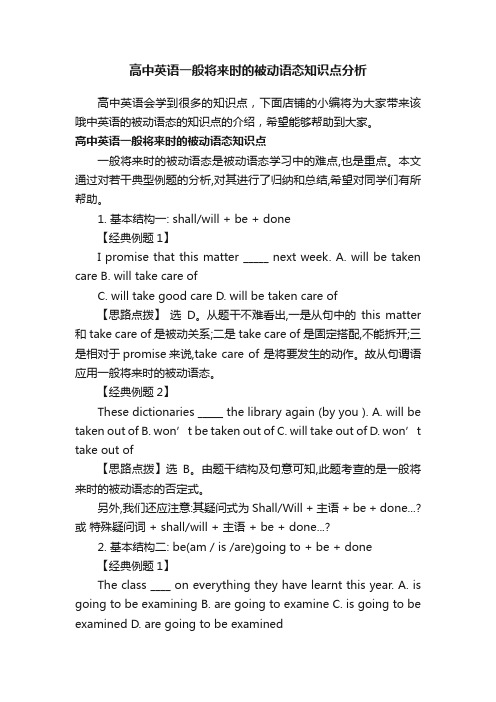
高中英语一般将来时的被动语态知识点分析高中英语会学到很多的知识点,下面店铺的小编将为大家带来该哦中英语的被动语态的知识点的介绍,希望能够帮助到大家。
高中英语一般将来时的被动语态知识点一般将来时的被动语态是被动语态学习中的难点,也是重点。
本文通过对若干典型例题的分析,对其进行了归纳和总结,希望对同学们有所帮助。
1. 基本结构一: shall/will + be + done【经典例题1】I promise that this matter _____ next week. A. will be taken care B. will take care ofC. will take good careD. will be taken care of【思路点拨】选D。
从题干不难看出,一是从句中的this matter 和 take care of 是被动关系;二是take care of 是固定搭配,不能拆开;三是相对于promise来说,take care of 是将要发生的动作。
故从句谓语应用一般将来时的被动语态。
【经典例题2】These dictionaries _____ the library again (by you ). A. will be taken out of B. won’t be taken out of C. will take out of D. won’t take out of【思路点拨】选B。
由题干结构及句意可知,此题考查的是一般将来时的被动语态的否定式。
另外,我们还应注意:其疑问式为Shall/Will + 主语 + be + done...? 或特殊疑问词 + shall/will + 主语 + be + done...?2. 基本结构二: be(am / is /are)going to + be + done【经典例题1】The class ____ on everything they have learnt this year. A. is going to be examining B. are going to examine C. is going to be examined D. are going to be examined【思路点拨】选D。


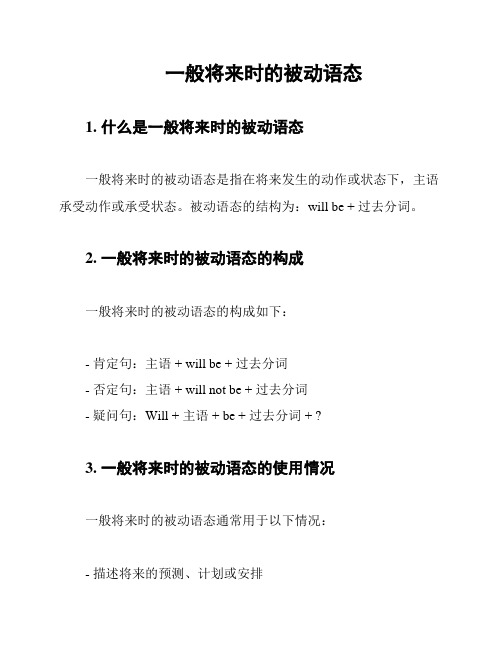
一般将来时的被动语态1. 什么是一般将来时的被动语态一般将来时的被动语态是指在将来发生的动作或状态下,主语承受动作或承受状态。
被动语态的结构为:will be + 过去分词。
2. 一般将来时的被动语态的构成一般将来时的被动语态的构成如下:- 肯定句:主语 + will be + 过去分词- 否定句:主语 + will not be + 过去分词- 疑问句:Will + 主语 + be + 过去分词 + ?3. 一般将来时的被动语态的使用情况一般将来时的被动语态通常用于以下情况:- 描述将来的预测、计划或安排- The meeting will be held next week. (会议将于下周举行。
)- The house will be renovated next month. (房子将在下个月进行翻修。
)- 描述某人对将来事件的预测或判断- The movie will be loved by audiences. (这部电影将会受到观众的喜爱。
)- The new product will be well received in the market. (这个新产品将在市场上受到好评。
)- 描述按计划或安排将要发生的动作或事件- The report will be submitted before the deadline. (报告将会在截止日期之前提交。
)- The package will be delivered to your address tomorrow. (包裹将于明天送到您的地址。
)4. 小结一般将来时的被动语态是在将来发生的动作或状态下,主语承受动作或承受状态的语态形式。
它的构成为:will be + 过去分词。
一般将来时的被动语态通常用于描述将来的预测、计划或安排,某人对将来事件的预测或判断,以及按计划或安排将要发生的动作或事件。